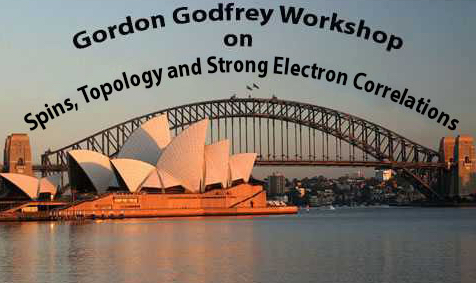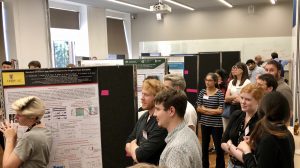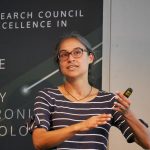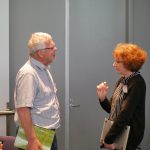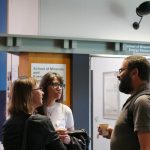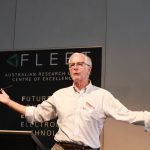Almost 120 researchers gathered in UNSW last week to discuss spin and strong-electron correlations in the university’s biennial Gordon Godfrey Workshop.
The 2019 Gordon Godfrey Workshop on Spins and Strong Correlations was held at UNSW’s School of Physics for five days from 25 to 29 November.
The Gordon Godfrey Workshops, which have been running since 1991, provide a forum for Australian and international researchers to exchange ideas and build future networks and collaborations, strengthening Australian science. These workshops are open to all interested researchers and students, and are run with no registration fee to encourage participation from as wide an audience as possible.
The workshop was opened by UNSW DVC-Research Prof Nicholas Fisk, and featured discussion topics such as spin–orbit interactions in itinerant systems and nanostructures, novel two-dimensional materials, charge transport, exciton condensates and electron-hole superfluidity. These made the workshop particularly valuable for FLEET, as well as for the quantum-material research community generally.
Of the 38 speakers, 18 were International researchers, representing 13 different countries. One third of the speakers were female, which is significantly higher than the proportion active in the fields of quantum, theoretical and condensed-matter physics.
Thirty students and Early Career Researchers presented their own research in a poster evening at UNSW. This was coordinated with the new Sydney Research Showcase, which brought posters on quantum materials to UNSW, as well as poster sessions on astronomy (at Macquarie University) and photonics (University of Sydney) to highlight the strength of research across the region.
This event is primarily supported by the Gordon Godfrey Bequest within the School of Physics at UNSW; attracting additional support from the ARC Centre of Excellence for Future Low Energy Electronics (FLEET), and the NSW Government, through the Office of the NSW Chief Scientist & Engineer.
The event was organised by FLEET investigators: Scientia Prof. Alex Hamilton, Prof. Oleg Sushkov and A/Prof. Dimi Culcer, with unfailing support by FLEETs UNSW Node Administrator Cecilia Bloise.
UNSW’s School of Physics is one of the largest physics schools in Australia.
- 801 Full time undergraduates
- 35 postdoctoral researchers
- 68 Higher Degree Students
- World Leading teaching Labs
- Outstanding educational focussed staff
- 828 journal articles
- 4 ARC Centres of excellence
The School is at the forefront of fundamental and applied physics:
- Quantum-phenomena for computation and sensing
- Quantum materials for low-energy electronics and photovoltaics
- Physical basis for life processes at the molecular and cellular level
- Synergies between astro-physics, cosmology, and high-energy physics
- Looking for the first stars in the universe and explore new worlds
Professor Gordon Godfrey was Deputy Head of UNSW’s School of Applied Physics, and made many contributions to physics research and education. His MA thesis, written in 1919, was probably the first paper written in Australia on special relativity. The Godfrey Bequest supports theoretical physics at UNSW, including financial support to bring academic visitors to the University, undergraduate prizes, postgraduate scholarships, and the workshop.

